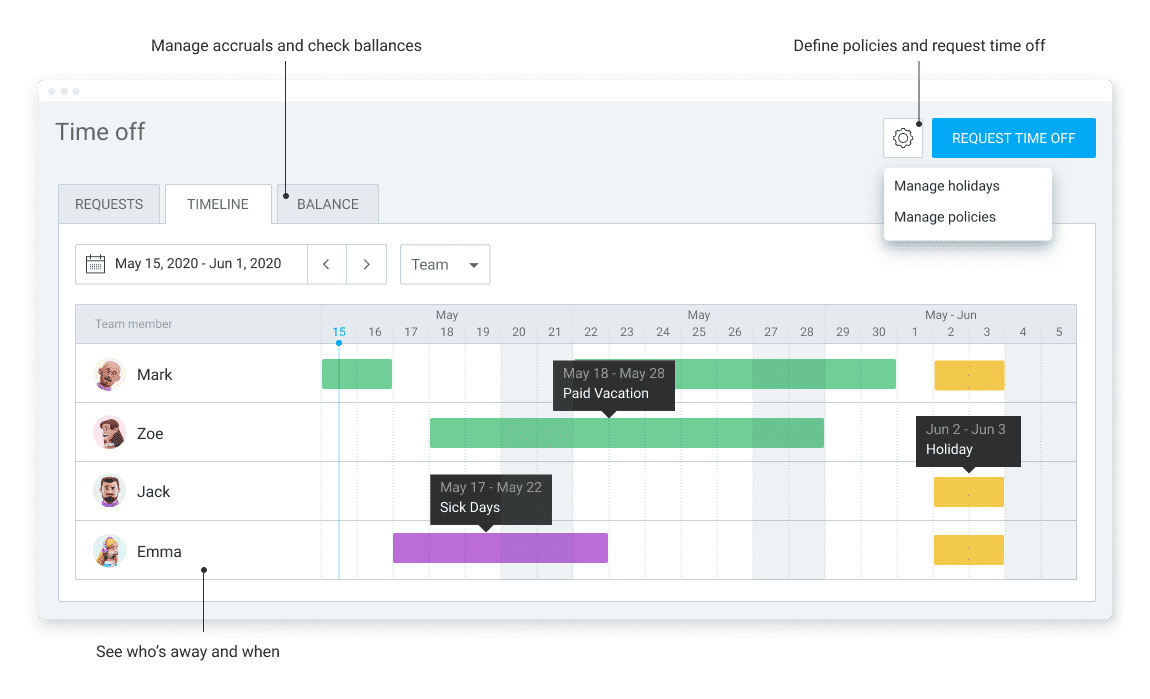If you plan to take any type of PTO, remember that based on federal law in the US, employers are not required to offer paid time off to employees.
The same goes for bereavement or funeral leave — the Fair Labor Standards Act leaves this matter to employment agreements and company policies.
However, state laws on bereavement leave in the US vary. Depending on your state, you might be eligible for paid or unpaid funeral leave.
In this text, we will:
- Define bereavement leave,
- Go over bereavement leave laws in different US states,
- Guide you on how to ask for bereavement leave, and
- Answer FAQs about bereavement leave.
Let’s start.
*Note: The information regarding bereavement leave in the US has been checked and updated for 2025.

- Bereavement leave is used after the death of a loved one, to grieve, make funeral arrangements, and attend to other related matters.
- Federal law in the US doesn’t mandate bereavement leave, so its availability depends on company policies and relevant state laws.
- Some states (like California and Illinois) require employers to provide bereavement leave.
- Most employers who offer bereavement leave institute policies that dictate the length, compensation, and similar terms for this type of PTO.
What is bereavement leave?
Bereavement leave is time off granted to an employee following the death of a close family member or friend.
Employees use this leave to organize and attend the funeral, manage personal affairs related to the passing of a loved one, and grieve their loss. Bereavement leave is also often referred to as funeral leave or bereaved leave.
How does bereavement leave work?
An employee may get leave for the death of an immediate family member to grieve, handle funeral arrangements, and attend the funeral. An immediate family member can be a:
- Spouse,
- Child, foster child, or step-child,
- Grandchild,
- Sibling,
- Parent, or
- Grandparent.
Immediate family members may also include a former spouse or relatives such as cousins, aunts, uncles, etc. Some companies even grant leave after losing a friend or a pet.
Whether bereavement leave is offered (paid or unpaid) depends on employment agreements, company policies, and state laws.
🎓 Compliance with various state laws in the US can be challenging. For more information on relevant laws, here’s a guide on labor laws across the country: State Labor Laws Guides
How long is bereavement leave?
The length of bereavement leave can be determined by state laws (which we’ll explore later in this text) and the agreement between an employee and employer.
For instance, some companies offer at least 3 paid days off after the death of a close family member and 1 day off for extended relatives.
Is bereavement leave paid?
Whether bereavement leave is paid or unpaid depends on your employment agreement.
Even in states where funeral leave is mandatory, state laws don’t require employers to offer bereavement pay. As a result, the question comes down to company policy.
While not required by law, many companies offer a few days of paid bereavement leave to show support for a grieving employee.
What is a typical bereavement leave policy?
A standard bereavement policy includes conditions like:
- Eligibility — stating whether full-time or part-time employees are eligible for the leave and which employees qualify,
- Duration — stating how much time off employees can request in such circumstances,
- Compensation — stating whether employees requesting funeral leave are entitled to time off with or without pay, and
- Documentation — stating the documents necessary for requesting bereavement leave, potentially including a copy of an obituary or death certificate, travel documents, etc.
Most state laws allow employers to decide the specifics of company bereavement policies. However, some states may mandate specific conditions, like eligibility and duration.
To ensure compliance, employers should check local regulations before crafting funeral leave policies.
How do I ask my boss for bereavement leave?
To properly request bereavement leave from your employer, follow the steps below:
Step #1: Check your company’s policy
Your time off depends on your workplace bereavement leave policy. If you’re unsure of the policy, check your employee handbook to learn your rights and responsibilities when requesting time off.
The company policy determines:
- How much time off you will get,
- Whether you will get paid or unpaid time off, or
- Whether funeral leave is separate from other types of leave (some companies may offer vacation days instead of a separate bereaved leave of absence).
Still, some companies don’t have official bereavement leave terms. In that case, communicate your needs with your employer, manager, or HR department and see how much time off work you can get.
Step #2: Inform your employer
Depending on your company’s policy or state law, you may need to send a prior notice via email or by contacting the HR department. Also, some companies may require you to fill out an electronic or a paper form.
It’s important to tell your employer about your bereavement leave as soon as possible and provide other relevant information, such as travel plans, dates of absence, and similar.
🎓 As an employer, dealing with no-shows can be difficult. Here’s a guide on handling absent employees professionally: How to Handle No Call No Show Cases (+ Examples and Templates)
Step #3: Provide necessary documentation
Before approving your bereavement leave, your employer or HR department may ask for evidence of your loved one’s passing, such as:
- An obituary,
- A death certificate, or
- Written certification from a funeral home, government agency, or religious institution.
However, you probably won’t have to provide this documentation before you take your leave. In most cases, you have up to 30 days from the start of your time off to produce the necessary documents.
Step #4: Keep your colleagues in the loop
Before taking your leave, notify your colleagues about the time you will be absent, together with your current tasks and responsibilities. That way, they’ll know what needs to be handled until you return to work.
Also, leave your contact details so they can reach you in an emergency.
🎓 Learn everything you need to know about employee absenteeism here: What Is Absenteeism? Causes and Consequences
State Bereavement Leave Laws 2025
The following table will provide more details about the 5 states that regulate bereavement leave in 2025.
| State | Eligible employers and employees | Number of days offered | Qualifying reason for taking bereavement leave | Paid or unpaid bereavement leave | Needed documentation |
|---|---|---|---|---|---|
| California | All employers with 5 or more employees. All employees who are employed for at least 30 days before the beginning of the bereaved leave (doesn’t apply to employees covered by a valid collective bargaining agreement). | Up to 5 days of bereavement leave. | Upon the death of a spouse, child, parent, sibling, grandparent, grandchild, domestic partner, or parent-in-law. | This leave does not have to be paid. | A death certificate, a published obituary, or written verification of death, burial, or memorial services from a mortuary, funeral home, burial society, crematorium, religious institution, or governmental agency. |
| Illinois | All employers with 50 or more employees are covered by the federal Family and Medical Leave Act. All employees who have worked at least 1,250 hours of service in the last 12-month period. | A maximum of 10 workdays. | Upon the death of a “covered family member” such as a child, stepchild, spouse, domestic partner, sibling, parent, parent-in-law, grandparent, grandchild, or stepparent. | Unpaid leave of absence. | A death certificate or published obituary as a proof. |
| Maryland | All employers with 15 or more employees. | Accrued and earned amount of leave. | An employee who’s lost their child, spouse, or parent. | Accrued paid leave (from sick leave, vacation time, and compensatory time). | N/A |
| Oregon | All employers with 25 or more employees. All employees who have worked for 180 calendar days (and an average of 25 hours/week) before the beginning of the bereaved leave. | Up to 2 weeks of bereaved leave. | Amid the death of a family member including a spouse, domestic partner, child, parent, parent’s spouse, sibling, stepsibling, grandparent, grandparent’s spouse, grandchild, grandchild’s spouse, or any other individual related by blood. | Unpaid leave of absence. | N/A |
| Washington | All employers and employees. | Up to 3 days. In addition, eligible employees may use family leave of up to 7 days in case of the death of their child. | Amid the death of a family member or household member. | Paid bereavement leave. In addition, employees may ask for additional paid leave from accrued vacation, holiday, sick leave, compensatory time, or personal holiday. | N/A |
FAQs about bereavement leave
If you need additional information about taking funeral leave, we’ve answered some of the most commonly asked questions on the topic below.
How long should you take off work after a bereavement?
As stated before, the time you will take off depends on your company’s policy concerning funeral leave (or the state you live in). Still, if you feel the time you were given to grieve is not enough, you may prolong your leave of absence and use PTO days instead.
🎓 If you want to learn more about PTO, accruals, benefits, and more, head to the link below: Your Ultimate PTO Accrual Guide: Definition, Benefits, and Tips
What’s the difference between bereavement leave and compassionate leave?
Sometimes, these two terms are used interchangeably — but they don’t mean the same thing. Namely, bereavement leave is time off taken amid the death of a loved one, while compassionate leave is time off granted to an employee to tend to a sick dependant or relative.
Examples of circumstances when someone may take compassionate leave may include:
- When a family member is seriously ill or injured,
- To attend to an urgent family matter,
- To care for a family member after an emergency such as crime, fire, flood, etc.
Does the federal law require employers to provide bereavement leave?
No, as mentioned earlier, the Fair Labor Standards Act does not oblige an employer to provide bereavement leave.
Whether an employee will be granted bereavement leave depends on the employer-employee agreement, the company’s policy, and the state where the employee works.
What states require employers to provide bereavement leave?
Currently, only 5 states oblige employers to provide bereaved leave to their employees, including:
- California,
- Illinois,
- Maryland,
- Oregon, and
- Washington.
Can an employer provide bereaved leave, even if not mandated by the state?
Yes. Even without a state law that mandates bereavement leave, an employer can offer their employees time off to grieve. Providing bereavement leave may boost employee mental health and increase morale and productivity in the workplace.
As many as 90% of US employers offer paid bereavement leave to their employees, as the International Foundation of Employee Benefit Plans states.
What are the benefits of employers providing bereaved leave?
Providing your employees with bereaved leave (paid or unpaid) leaves time for the grieved employee to heal after the loss of a loved one, encouraging a healthy work-life balance among workers. Moreover, it promotes a productive workplace and shows that you empathize with your employees during their loss.
🎓 If you are wondering how to boost employee productivity in general, head to the following link for more useful advice: 10 Fast Ways to Improve Employee Productivity in the Workplace
What if my employer doesn’t provide bereavement leave?
If your company doesn’t offer bereavement leave, you can use your vacation time or potentially take time off under the Family and Medical Leave Act (FMLA).
Under this act, eligible employees can take unpaid, job-protected leave for “specified family and medical reasons” of up to 12 workweeks (in 12 months).
Unfortunately, only cases of miscarriage and stillbirth qualify for bereavement leave under the FMLA.
🎓 Want to ask for time off but don’t know how? Read the following tips for some valuable advice: How to Request Time Off and Track It Successfully
What if I’m self-employed and bereaved?
As a self-employed individual, you bear the costs of your time off taken due to bereavement. Only company employees can be offered paid (or unpaid) bereaved leave of absence.
Manage time off efficiently with Clockify
Providing bereavement leave to grieving employees is a nice way to show empathy and support — even when it’s not mandated by law.
To prevent project delays when someone takes time off, ensure everyone’s workload is evenly distributed.
Clockify’s scheduling dashboard can help. Its visual, drag-and-drop interface simplifies scheduling and reassigning tasks.

On the dashboard, you can quickly see who can take on more work — overbooked team members are highlighted with a red line.
Also, all team members can see updates to the schedule in real time.
Clockify also simplifies time off requests.
On the platform’s Time off screen, employees can quickly make a request and their managers can approve it.

With Clockify, granting time off without endangering the company’s workflow is simple.
Please bear in mind — this bereavement leave laws guide was written in Q1 of 2025. Thus, it may not include changes introduced after it was published.
We strongly advise you to consult the appropriate institutions and/or certified representatives before acting on any legal matters.
Clockify is not responsible for any losses or risks incurred should this guide be used without legal guidance.
How we reviewed this post: Our writers & editors monitor the posts and update them when new information becomes available, to keep them fresh and relevant. Updated: February 11, 2025
Updated: February 11, 2025 

